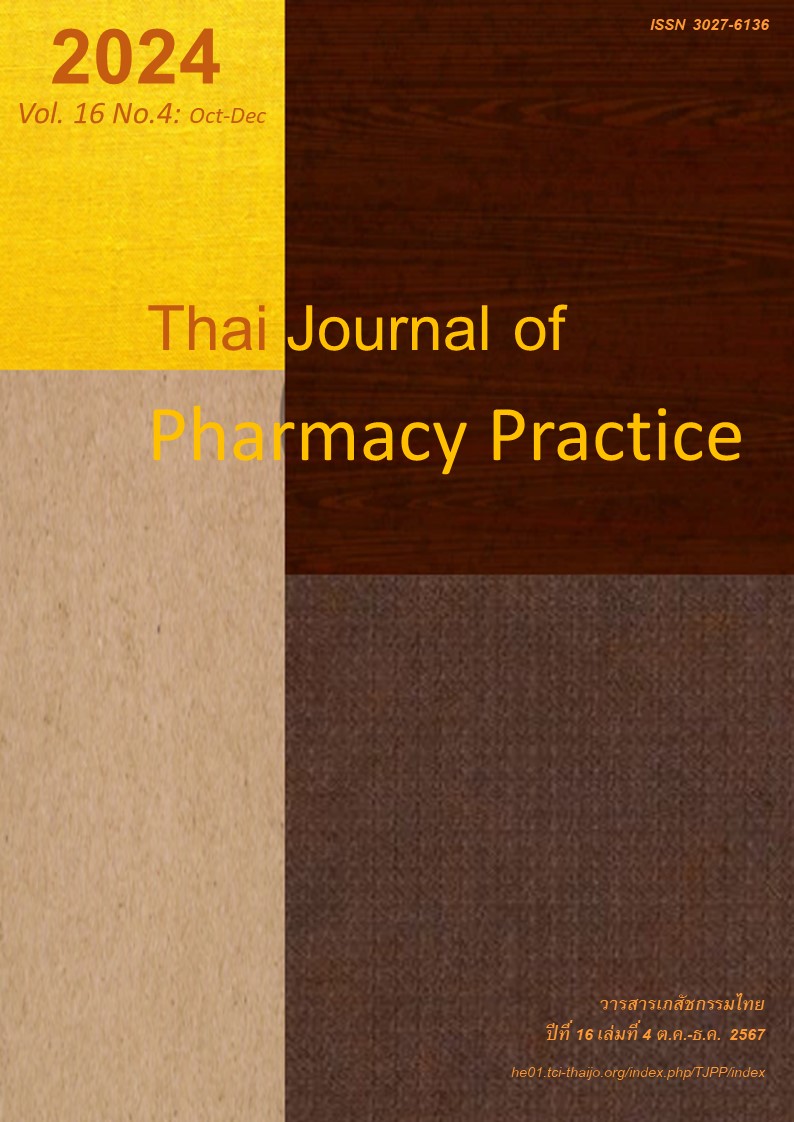ผลลัพธ์ของการบริบาลทางเภสัชกรรมร่วมกับแบบสอบถามพร้อมท์ที่มีต่อจำนวนปัญหาการใช้ยา ที่ค้นพบและอัตราการเข้ารับการรักษาตัวในโรงพยาบาลในผู้ป่วยนอกที่มีภาวะหัวใจล้มเหลว
Main Article Content
บทคัดย่อ
วัตถุประสงค์: เพื่อเปรียบเทียบผลลัพธ์ของการบริบาลทางเภสัชกรรมในผู้ป่วยนอกที่มีภาวะหัวใจล้มเหลวต่อจำนวนปัญหาการใช้ยาที่ค้นพบ และอัตราการเข้ารับการรักษาตัวในโรงพยาบาลจากภาวะหัวใจล้มเหลวกำเริบ ระหว่างกลุ่มผู้ป่วยที่ได้รับการบริบาลทางเภสัชกรรมร่วมกับแบบสอบถาม PROMPT และกลุ่มที่ได้รับบริการตามมาตรฐานปกติของโรงพยาบาล วิธีการ: การศึกษาเป็นการทดลองแบบสุ่มชนิดมีกลุ่มควบคุมแบบปกปิดทางเดียวในผู้ป่วยนอกที่มีภาวะหัวใจล้มเหลว ณ โรงพยาบาลพระนครศรีอยุธยา จำนวน 250 คน ระหว่างเดือนพฤศจิกายน 2565 ถึงพฤษภาคม 2566 โดยสุ่มผู้ป่วยเป็น 2 กลุ่ม คือ กลุ่มควบคุม (ได้รับบริการตามมาตรฐานปกติของโรงพยาบาล) และกลุ่มศึกษา (ได้รับการบริบาลทางเภสัชกรรมร่วมกับแบบสอบถาม PROMPT) ผู้วิจัยเก็บข้อมูลจำนวน 2 ครั้ง คือ ก่อนการแทรกแซงและหลังการแทรกแซงเมื่อผู้ป่วยมาพบแพทย์ในครั้งถัดไปที่ระยะเวลา 3 เดือน ผลการวิจัย: หลังจากได้รับการบริบาลทางเภสัชกรรม ในกลุ่มศึกษาพบจำนวนปัญหาจากการใช้ยาเฉลี่ยต่อรายมากกว่ากลุ่มควบคุมอย่างมีนัยสำคัญทางสถิติ (0.26 ± 0.54 และ 0.75 ± 0.79 ตามลำดับ, P < 0.001) แต่จำนวนครั้งของการเข้ารับการรักษาตัวในโรงพยาบาลจากภาวะหัวใจล้มเหลวกำเริบต่อรายระหว่างสองกลุ่มไม่แตกต่างกัน (0.09 ± 0.43 และ 0.04 ± 0.19 ครั้ง ตามลำดับ, P = 0.180) สรุป: การให้บริบาลทางเภสัชกรรมร่วมกับแบบสอบถาม PROMPT ในผู้ป่วยภาวะหัวใจล้มเหลวสามารถช่วยค้นหาปัญหาจากการใช้ยาของผู้ป่วยได้มากขึ้น
Article Details

อนุญาตภายใต้เงื่อนไข Creative Commons Attribution-NonCommercial-NoDerivatives 4.0 International License.
ผลการวิจัยและความคิดเห็นที่ปรากฏในบทความถือเป็นความคิดเห็นและอยู่ในความรับผิดชอบของผู้นิพนธ์ มิใช่ความเห็นหรือความรับผิดชอบของกองบรรณาธิการ หรือคณะเภสัชศาสตร์ มหาวิทยาลัยสงขลานครินทร์ ทั้งนี้ไม่รวมความผิดพลาดอันเกิดจากการพิมพ์ บทความที่ได้รับการเผยแพร่โดยวารสารเภสัชกรรมไทยถือเป็นสิทธิ์ของวารสารฯ
เอกสารอ้างอิง
Bragazzi NL, Zhong W, Shu J, Abu Much A, Lotan D, Grupper A, et al. Burden of heart failure and underlying causes in 195 countries and territories from 1990 to 2017. Eur J Prev Cardiol 2021; 28: 1682-90.
Dokainish H, Teo K, Zhu J, Roy A, AlHabib KF, ElSayed A, et al. Global mortality variations in patients with heart failure: results from the International Congestive Heart Failure (INTER-CHF) prospective cohort study. Lancet Glob Health 2017; 5: e665-e72.
Laothavorn P, Hengrussamee K, Kanjanavanit R, Moleerergpoom W, Laorakpongse D, Pachirat O, et al. Thai Acute Decompensated Heart Failure Registry (Thai ADHERE). Global Heart 2010; 5: 89-95.
Heidenreich PA, Bozkurt B, Aguilar D, Allen LA, Byun JJ, Colvin MM, et al. 2022 AHA/ACC/HFSA Guideline for the management of heart failure: A report of the American College of Cardiology/ American Heart Association Joint Committee on Clinical Practice Guidelines. J Am Coll Cardiol 2022; 79: e263-e421.
Beezer J, Al Hatrushi M, Husband A, Kurdi A, Forsyth P. Polypharmacy definition and prevalence in heart failure: a systematic review. Heart Fail Rev 2022; 27: 465-92.
Fitzgerald AA, Powers JD, Ho PM, Maddox TM, Peterson PN, Allen LA, et al. Impact of medication nonadherence on hospitalizations and mortality in heart failure. J Card Fail 2011; 17: 664-9.
Cipolle RJ, Strand LM, Morley PC. Pharmaceutical care practice: the patient-centered approach to medication management. 3rd ed. New York: McGraw-Hill; 2012.
West LM, Williams JB, Faulkenberg KD. The impact of pharmacist-based services across the spectrum of outpatient heart failure therapy. Curr Treat Options Cardiovasc Med 2019; 21: 59. doi: 10.1007/s11936-019-0750-3.
Jirapermpun A. Pharmaceutical care in outpatients with congestive heart failure at Maharat Nakonratchasima hospital [master thesis]. Bangkok: Chulalongkorn University; 2010.
Devahastin K. Pharmaceutical care in outpatients with congestive heart failure at Bhumibol Adulyadej Hospital, Directorate of Medical Services, Royal Thai Air Force [master thesis]. Bangkok: Chulalongkorn University; 2016.
Korajkic A, Poole S, MacFarlane L, Bergin P, Dooley M. Impact of a pharmacist Intervention on ambulatory patients with heart failure: A randomised controlled study. J Pharm Pract Res 2011; 41: 126-31
Chambela MDC, Mediano MFF, Carneiro FM, Ferreira RR, Waghabi MC, Mendes VG, et al. Impact of pharmaceutical care on the quality of life of patients with heart failure due to chronic Chagas disease: Randomized clinical trial. Br J Clin Pharmacol. 2020; 86: 143-54.
Schulz M, Griese-Mammen N, Schumacher PM, Anker SD, Koehler F, Ruckes C, et al. The impact of pharmacist/physician care on quality of life in elderly heart failure patients: results of the PHARM-CHF randomized controlled trial. ESC Heart Fail. 2020; 7: 3310-9.
World Health Organization. WHOQOL user manual, 2012 revision. Geneva: World Health Organization; 2012.
Sakthong P. Health-related quality of life. 2nd ed. Bangkok: Chulalongkorn University Press; 2019.
Murawski MM, Bentley JP. Pharmaceutical therapy related quality of life: conceptual development. J Soc Adm Pharm 2001; 18: 2-14.
Mohammed MA, Moles RJ, Hilmer SN, O'Donnel L, Chen TF. Development and validation of an instrument for measuring the burden of medicine on functioning and well-being: the Medication-Related Burden Quality of Life (MRB-QoL) tool. BMJ Open 2018; 8: e018880.
Sakthong P, Suksanga P, Sakulbumrungsil R, Winit-Watjana W. Development of Patient-reported Outcomes Measure of Pharmaceutical Therapy for Quality of Life (PROMPT-QoL): A novel instrument for medication management. Res Social Adm Pharm 2015; 11: 315-38.
Buddhanoy A. Evaluation of effects of drug therapy-related quality of life measure with pharmaceutical care for outpatients. [master thesis]. Bangkok: Chulalongkorn University; 2019.
Wanpen P. Effects of pharmaceutical care using PROMPT questionnaire in chronic kidney disease patients. [master thesis]. Bangkok: Chulalongkorn University; 2022.
Faul F, Erdfelder E, Buchner A, Lang AG. Statistical power analyses using G*Power 3.1: tests for correlation and regression analyses. Behav Res Methods. 2009; 41: 1149-60.
Sakthong P, Sonsa-Ardjit N, Sukarnjanaset P, Munpan W, Sangthonganotai T. Development and psychometrics of a short-form pharmaceutical care-specific measure for quality of life. Int J Clin Pharm. 2018; 40: 642-9.
Arunmanakul P, Kengkla K, Chaiyasothi T, Phrommintikul A, Ruengorn C, Permsuwan U, et al. Effects of pharmacist interventions on heart failure outcomes: A systematic review and meta-analysis. J Am Coll Clin Pharm. 2021; 4: 871-82.
Beezer J, Al Hatrushi M, Husband A, Kurdi A, Forsyth P. Polypharmacy definition and prevalence in heart failure: a systematic review. Heart Fail Rev 2022; 27: 465-92.
Tsige AW, Yikna BB, Altaye BM. Drug-related problems among ambulatory heart failure patients on follow-up at Debre Berhan comprehensive specialized hospital, Ethiopia. Ther Clin Risk Manag 2021: 17; 1165-75.
Bouvy ML, Heerdink ER, Urquhart J, Grobbee DE, Hoe AW, Leufkens HG. Effect of a pharmacist-led intervention on diuretic compliance in heart failure patients: A randomized controlled study. J Card Fail 2003; 9: 404-11.
Lowrie R, Mair FS, Greenlaw N, Forsyth P, Jhund PS, McConnachie A. Pharmacist intervention in primary care to improve outcomes in patients with left ventricular systolic dysfunction. Eur Heart J 2012; 33: 314-24.
Hale GM, Hassan SL, Hummel SL, Lewis C, Ratz D, Brenner M. Impact of a pharmacist-managed heart failure postdischarge (Bridge) Clinic for Veterans. Ann Pharmacother 2017; 51: 555-62.
Schulz M, Griese-Mammen N, Anker SD, Koehler F, Ihle P, Ruckes C, et al. Pharmacy-based interdisciplinary intervention for patients with chronic heart failure: results of the PHARM-CHF randomized controlled trial. Eur J Heart Fail 2019; 21: 1012-21.


